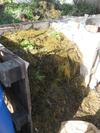Dear Reader, in this age of AI created content, please support with your goodwill someone who works harder to provide the human-made. Sign up at the top of the lefthand column or bottom of this page. You will receive my hand illustrated monthly newsletter RESTORE NATURE and access to the biodiversity garden design course as I write...and nothing else, I respect your time. I am also removing the advertizing as best I can as its become intrusive inappropriate and pays me nothing.
How to make organic garden fertilizer using
hot compost
 Marcé talking about hot composting at tufco gathering
Marcé talking about hot composting at tufco gatheringThe hot compost or aerobic compost producing process is one of the fastest forms of composting. Some months ago I attended the TUFCO gathering and one of their talks was on aerobic composting. This article has been a long time coming (could have made 5 compost batches in the interim) because after I wrote the original my hard drive was permanently disabled.
I’ve finally got round to accepting what I lost and getting up and starting again. An added motivation was that my interest in has been re-stimulated by this article
http://civileats.com/2016/06/01/can-compost-recycle-our-drugs/
in which research in San fransicso appears to show that the aerobic composting of human waste (humanure) not only eliminates the pathogens in human feces, a major reason why their use as compost involves so much restrictive legislation worldwide, but hot composting may also degrade and neutralize the drugs, like antibiotics, we carry in our systems and excrete. The significance is that these drugs get into the larger environment and I imagine cause havoc to natural eco systems dependent on bacteria,and other microorganisms. Antibiotics would kill or if in low doses cause each successive generation of microorganism to evolve in the direction of antibiotic resistance which has become a huge problem for human health globally. Probably the authors implied areas of medicine like the fight against malaria. This illness I believe is the most awful scourge on the planet and must be eliminated. However drug development does not seem able to keep up with the rapid evolution of the resistance of the disease bearing Trypanosome (a protozoan, not a bacteria). Then there are hospital infections and drug resistant TB causing unnecessary death of vulnerable and aged people.
hot compost
So the time has come to address aerobic composting on this site. At the TUFCO gathering, the talk on hot composting was given by Marcé, a young man who also works for the Wellness Warehouse at the Paddocks, when not educating the public on composting. You can contact Marcé at iammarce@live.com. For understanding and learning more about hot composting, he recommends Jeff Laughton videos. He watched them repeatedly himself, on the way to acquiring his PDC (permaculture) certificate at Honeyville farm.
Marcé explained to the gathering how to make compost in 18-21 days with the hot process. First of all he had to expand on the plant nutrients, so that one can understand more of the process which involves macro-nutrient chemistry. You don’t have to know this to apply the method, its been done for thousands of years before the nutrients were discovered.
plant nutrition in organic compost
There are 16 essentials that plants need: the macro nutrients usually absorbed from the soil are Nitrogen (N), Phosphorus (P), and Potassium (K, from its classic name Kalium), then come the group Calcium (Ca), Sulphur (S), and Magnesium (Mg). There are also some other major nutrients, acquired either from the air, or soil. There is Hydrogen (H), and Oxygen (O), in water H2O, and there is Carbon (C) in Carbon dioxide (CO2), which is the major energy harnessing building stone. So we’re at 9 elements now… leaving 7, micro nutrients. A quick perfunctory online search: http://eldoradochemical.com/fertiliz1.htm lists the micronutrients as Boron (B), Chlorine (Cl), Copper (Cu), Iron (Fe), Manganese (Mn), Molybdenum (Mo), Zinc (Zn), that is 7, making the nutrient count 16. I see a lot of websites mention the essential 16, so this looks like something we can stay with for the time being, but no, Wiki (https://en.wikipedia.org/wiki/Plant_nutrition) lists others, Sodium (Na (from Natrium), Nickel (Ni), Cobalt (Co), Aluminium (Al), Silicon (Si), Vanadium (V) and Selenium (Se).
More on plant nutrient absorption
Nitrogen is a component of the molecules involved in photosynthesis and is used in the forming of vitamins. Nitrogen deficiency is shown by yellow leaves. Micro organisms are essential to the plant’s absorbtion. Fungus helps the roots pull up Nitrogen. The underground mycelial network is enormous (see soil and the permaculture workshop I attended). These days you can buy mycelium. Bacteria convert Nitrogen to a from a plant can use. Phosphorus is also important for photosynthesis and root and seed formation. Potassium is involved in fruit formation, and is an enzyme activator and is vital for resistance to disease.
To summarize, during growth periods, the nutrient Nitrogen is very important and dominant, and during fruiting, Potassium and Phosphorus are important. Sulphur helps in seed formation, and is involved with enzyme and vitamin production, and resistance to disease.
Please see the next article on aerobic or hot composting for information on the how to of the process made elegantly simple by Marcé's talk, now that we have dispensed with the background on nutrients.
------
home page for green ideas and ideology
------
vegetable gardening the natural low cost way
------
gardening and where it all began
------
Hot composting (or Aerobic composting) how to
------
DIY rich organic garden fertilizer
You’re a home gardener ! Share your experiences and questions !
We all know about home gardening. Tell us about your successes, challenges and ask about issues that bother you. You may have the luxury of a back garden, but there are other ways we learn. Few people age without growing something or buying vegetables during their lives ! It is absolutely guaranteed that you have learned things which can help others on their gardening journey.
We invite you to share your stories, ask questions, because if a thing has bothered you it will bother others too. Someone may have a solution ! No question is too small. There is learning for everyone involved, for you, for me (yes, I learn from every question), for us all. Exciting stuff !
We are starting on a new journey. Every week we will profile your letters ! The best stories and questions we receive.
What Other Visitors Have Said
Click below to see contributions from other visitors to this page...
charging up a compost pile 




I have done quite a few batches of hot compost. It is great because it is quick, processing in a matter of weeks, and gets so hot that it eliminates both …
Restore Nature Newsletter
I've been writing for four years now and I would love to hear from you
Please let me know if you have any questions, comments or stories to share on gardening, permaculture, regenerative agriculture, food forests, natural gardening, do nothing gardening, observations about pests and diseases, foraging, dealing with and using weeds constructively, composting and going offgrid.
SEARCH
Order the Kindle E-book for the SPECIAL PRICE of only
Prices valid till 30.09.2023
Recent Articles
-
garden for life is a blog about saving the earth one garden at a time
Apr 18, 25 01:18 PM
The garden for life blog has short articles on gardening for biodiversity with native plants and regenerating soil for climate amelioration and nutritious food -
Cape Flats Sand Fynbos, Cape Town's most endangered native vegetation!
Apr 18, 25 10:36 AM
Cape Flats Sand Fynbos, a vegetation type found in the super diverse Cape Fynbos region is threatened by Cape Town's urban development and invasive alien plants -
Geography Research Task
Jan 31, 25 11:37 PM
To whom it may concern My name is Tanyaradzwa Madziwa and I am a matric student at Springfield Convent School. As part of our geography syllabus for this
"How to start a profitable worm business on a shoestring budget
Order a printed copy from "Amazon" at the SPECIAL PRICE of only
or a digital version from the "Kindle" store at the SPECIAL PRICE of only
Prices valid till 30.09.2023








